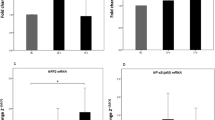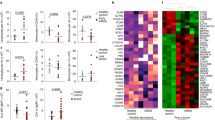Abstract
ALTHOUGH the response of erythrocytes and their precursors to hypoxia has been extensively studied, much less is known of the changes in the leucocytes and their precursors. The presence of increased numbers of eosinophil granulocytes in the circulation of human subjects following exposure to hypoxia, however, has been noted1.
This is a preview of subscription content, access via your institution
Access options
Subscribe to this journal
Receive 51 print issues and online access
$199.00 per year
only $3.90 per issue
Buy this article
- Purchase on Springer Link
- Instant access to full article PDF
Prices may be subject to local taxes which are calculated during checkout
Similar content being viewed by others
References
Verzar, F., Schweiz. Med. Wschr., 82, 324 (1952).
Yoffey, J. M., Smith, N. C. W., and Wilson, R. S., Scand. J. Haemat., 3, 186 (1966).
Hudson, G., in Bone Marrow Reactions (edit. by Yoffey, J. M.), chap. 5 (Arnold, London).
Hudson, G., Amer. J. Physiol., 198, 1171 (1960).
Author information
Authors and Affiliations
Rights and permissions
About this article
Cite this article
HUDSON, G., SMITH, N., WILSON, R. et al. Eosinophil Granulocytes and Hypoxia. Nature 213, 818–819 (1967). https://doi.org/10.1038/213818a0
Issue Date:
DOI: https://doi.org/10.1038/213818a0
This article is cited by
-
Zur Pathomorphologie der Megakaryocyten nach einstündiger absoluter Knochenmarksischämie
Zeitschrift für die gesamte experimentelle Medizin einschließlich experimentelle Chirurgie (1971)
-
Morphologische Untersuchungen zur Proliferationskinetik der normalen und pathologischen Granulozytopoese in vitro
Blut Zeitschrift für die Gesamte Blutforschung (1969)
Comments
By submitting a comment you agree to abide by our Terms and Community Guidelines. If you find something abusive or that does not comply with our terms or guidelines please flag it as inappropriate.



